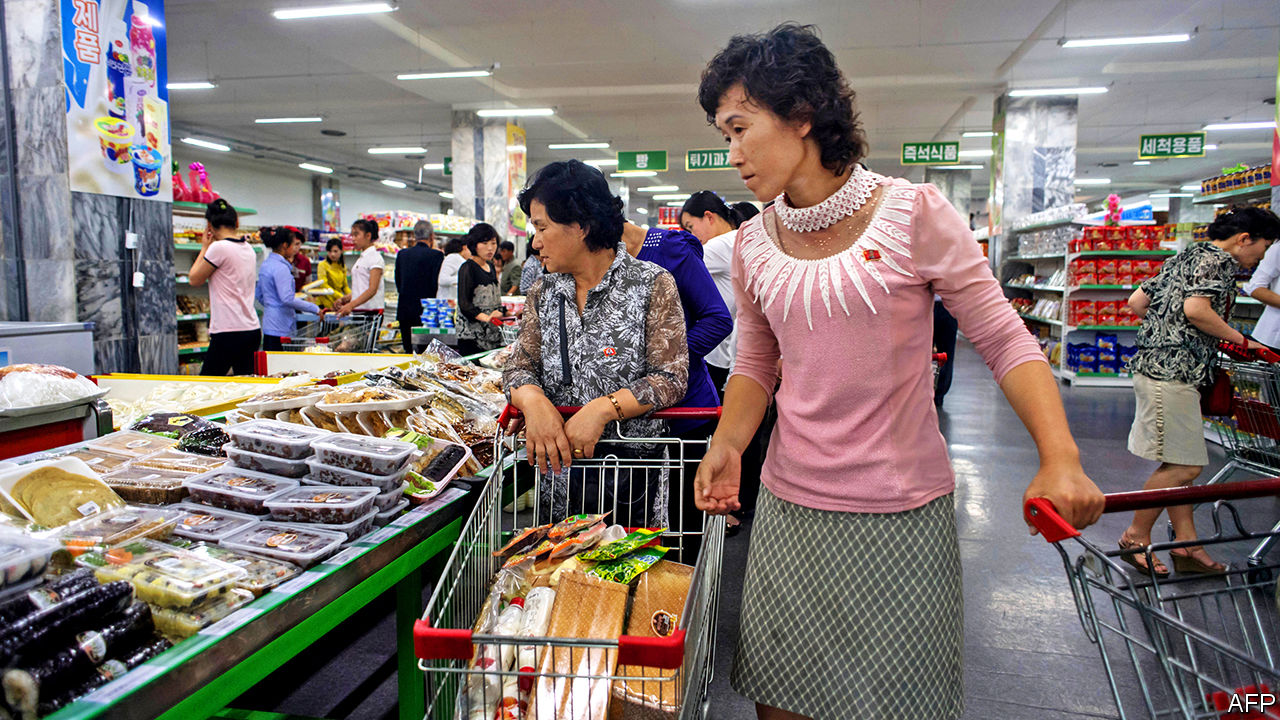
WALK down the streets of Pyongyang, North Korea’s capital, and at first sight the passers-by look rather uniform. The women are in tidy skirt suits and medium-high heels. The men sport variations on the theme of the jacket and wide trousers preferred by Kim Jong Un, the country’s leader. Government-mandated lapel pins with portraits of one or both of Mr Kim’s predecessors continue to be ubiquitous. But look closer and a wealth of individual variations can be seen, particularly among the women: some bright-coloured lace stitched onto a jacket here, a daringly cut skirt in a sparkling satin material there.
Although fashion from China and even from—Kim forbid—South Korea is increasingly making its way to the markets of Pyongyang, many of these flourishes are the work of the city’s own tailors. They may be only a small subset of North Korea’s textile industry—which accounted for around 30% of exports before being hit by sanctions last autumn—but they are one of many emerging shoots of private enterprise in a country which officially bans such activities. Unlike the bigger textile factories along the border with China, which send their output to global markets under “Made in China” labels, Pyongyang’s tailoring businesses cater to locals. Many are run by women and have only a handful of employees. Most are officially affiliated with state-run textile firms and must pay these a share of profits, but operate largely independently.
-
Donald Trump cancels his meeting with Kim Jong Un
-
Barbados’s mucky election
-
Freedom of speech and religion is not a licence to discriminate
-
Introducing our prediction model for America’s mid-term elections
-
Billions of women are denied the same choice of employment as men
-
Who’s ahead in the mid-term race
The tailors are responding to demand from a small but growing customer base. An increasing number of Pyongyang’s residents are comparatively flush financially, either because they belong to the political elite, or are involved in semi-official private enterprise, or both. They are keen to distinguish themselves from their peers. “If you buy clothes in a shop you just have the same as everyone else,” says one woman whose sister sketches the designs she takes to the tailor. “That’s boring. I want to look different.”
A few years ago such a remark might have got a budding fashionista in trouble. Deviating from the officially approved look of either traditional Korean clothing or dark, loose-fitting suits and flat shoes for women was long interpreted and punished as political dissent. Blue jeans, associated with America, are still out. But although Mr Kim’s regime continues to crack down on more overtly political expressions of individuality, fashion is increasingly tolerated.
Stylishness does not come cheap. Customers report that prices at the city’s better-known tailors, who develop their own brands and sometimes even run advertisements on local television, range from $8-50 for a shirt and start at around $100 for a suit. That is significantly pricier than off-the-peg clothes in Pyongyang’s mid-range department stores or in informal markets. The fabric, which locals say tends to come in from China or elsewhere rather than from domestic factories, accounts for a large portion of the cost. But imports can bring excitement. “Once they got a batch of cloth in from England,” says one woman, her eyes glinting. Never mind that the label may well have been faked: the other side of the world seems suddenly closer.
Source: economist
Tailor shops are a thriving pocket of enterprise in Pyongyang